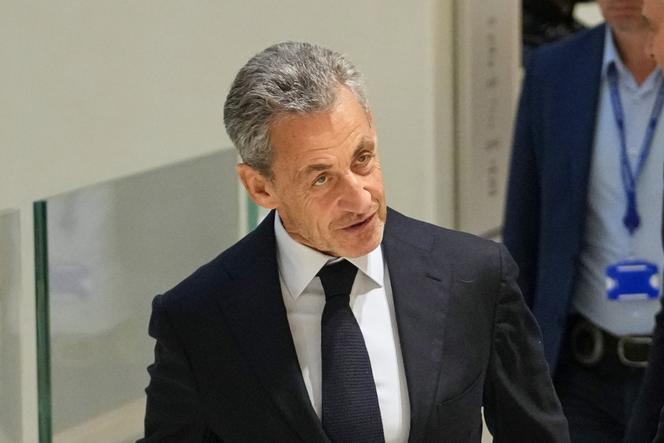


A Paris court sentenced former French president Nicolas Sarkozy to five years in prison on Thursday, September 25, after finding him guilty of criminal conspiracy at his trial over alleged illegal campaign financing for his 2007 presidential bid from Libyan dictator Muammar Gaddafi.
He will start serving his sentence even if he appeals, the court said. It said the date of his incarceration will be decided later, in a month's time at most.
Sarkozy was acquitted on three other charges, including corruption, but Judge Nathalie Gavarino said he had "allowed his close aides (...) to act with a view to obtaining financial support" for the campaign.
Two former close aides were also convicted. His former right-hand man Claude Guéant was found guilty of passive corruption and falsification while former minister Brice Hortefeux was found guilty of criminal conspiracy. Eric Woerth, Sarkozy's 2007 campaign treasurer, was acquitted.
Sarkozy, accompanied by his wife, the singer and model Carla Bruni-Sarkozy, entered a courtroom filled with reporters and members of the public. Sarkozy sat in the front row of the defendant's seats. His three adult sons were also in the room. Sarkozy, who was elected in 2007 but lost his bid for reelection in 2012, denied all wrongdoing during a three-month trial earlier this year that also involved 11 co-defendants, including three former ministers.
The accusations trace their roots to 2011, when a Libyan news agency and Gaddafi himself said the Libyan state had secretly funneled millions of euros into Sarkozy's 2007 campaign. In 2012, the French investigative outlet Mediapart published what it said was a Libyan intelligence memo referencing a €50 million funding agreement. Sarkozy denounced the document as a forgery and sued for defamation. Investigators also looked into a series of trips to Libya made by people close to Sarkozy when he served as interior minister from 2005 and 2007, including his chief of staff.
The court on Thursday said there was no proof that money from Gaddafi's regime was used in Sarkozy's campaign. "For the court, the material elements have not been established that a corruption offence has been committed," said presiding judge Gavarino.
In 2016, French-Lebanese businessman Ziad Takieddine told Mediapart that he had delivered suitcases filled with cash from Tripoli to the French Interior Ministry under Sarkozy. He later retracted his statement. That reversal is now the focus of a separate investigation into possible witness tampering. Both Sarkozy and his wife, Carla Bruni-Sarkozy, were handed preliminary charges for involvement in alleged efforts to pressure Takieddine. That case has not gone to trial yet.
Takieddine, who was one of the co-defendants, died on Tuesday in Beirut, his lawyer Elise Arfi said. He was 75. He had fled to Lebanon in 2020 and did not attend the trial.
Sarkozy was tried on charges of passive corruption, illegal campaign financing, concealment of the embezzlement of public funds and criminal association. Prosecutors alleged that Sarkozy had knowingly benefited from what they described as a "corruption pact" with Gaddafi's government. Libya's longtime dictator was toppled and killed in an uprising in 2011, ending his four-decade rule of the North African country.
The trial shed light on France's back-channel talks with Libya in the 2000s, when Gaddafi was seeking to restore diplomatic ties with the West. Before that, Libya was considered a pariah state. Sarkozy has dismissed the allegations as politically motivated and reliant on forged evidence. During the trial, he denounced a "plot" he said was staged by "liars and crooks" including the "Gaddafi clan."
He suggested that the allegations of campaign financing were retaliation for his call – as France's president – for Gaddafi's removal. Sarkozy was one of the first Western leaders to push for military intervention in Libya in 2011, when Arab Spring pro-democracy protests swept the Arab world. "What credibility can be given to such statements marked by the seal of vengeance?" Sarkozy asked in comments during the trial.
In June, Sarkozy was stripped of his Legion of Honor medal, France's highest award, after his conviction in a separate case. Earlier, he was found guilty of corruption and influence peddling for trying to bribe a magistrate in 2014 in exchange for information about a legal case in which he was implicated. Sarkozy was sentenced to wear an electronic monitoring bracelet for one year. He was granted a conditional release in May due to his age, which allowed him to remove the electronic tag after he wore it for just over three months.
In another case, Sarkozy was convicted last year of illegal campaign financing in his failed 2012 reelection bid. He was accused of having spent almost twice the maximum legal amount and was sentenced to a year in prison, of which six months were suspended. Sarkozy has denied the allegations. He has appealed that verdict to the highest Court of Cassation, and that appeal is pending
